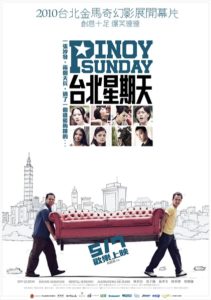Pinoy Sunday
台北星期天
Taiwan/France/Japan/Philippines, 2009, colour, 1.85:1, 85 mins.
Director: He Weiting 何蔚庭 [Ho Wi Ding].
Rating: 7/10.
Vignettish “road movie” about two Filipino workers on their day off in Taibei is slim but likeable.
Taiwan, the present day. Diosdado “Dado” Tagalog (Bayam Agbayani) and Manuel Dela Cruz (Jeffrey “Epy” Quizon) are among a group of Filipino overseas workers from Kalibo, in the southern Philippines, at a bicycle factory on the outskirts of Taibei. They live together in a dormitory with a strict, government-mandated curfew. Manuel has been unsuccessfully trying to date Celia (Alessandra De Rossi), a Filipina he met at a club, and Dado, despite having a wife and young daughter back home, has been getting friendly with another Filipina, Anna (Meryll Soriano). Feeling guilty when his wife is hospitalised after a traffic accident, Dado breaks off with Anna on her birthday. One Sunday, on their day off, Dado and Manuel chance upon a handsome red sofa that a house-moving couple leave on the pavement. Manuel sees it as “a gift from God” and persuades Dado to help him carry it back through the streets to their dormitory before curfew – a journey that turns into a life-changing odyssey.
REVIEW
Malaysia-born, Taiwan-based director He Weiting [Ho Wi Ding] was previously known for his shorts Respire 呼吸 (2005) and Summer Afternoon 夏午 (2008) and, despite its considerable merits, his first feature Pinoy Sunday 台北星期天 is basically a short in spirit. However, thanks to its technical polish, with richly-coloured photography by Jake Pollock 包轩鸣 (The Message 风声, 2009; Monga 艋舺, 2010), fluid editing by Xu Weiyao 许惟尧 and a whistled, lazy-day score by Cai Yaoren 蔡曜任, the material just about makes it past the 80-minute finishing line, helped by a likeable pairing of Filipino comedians Bayam Agbayani and Jeffrey “Epy” Quizon as the two leads.
The movie proper starts at the 30-minute mark, after an extended intro that fills in some of the characters’ background and then sets up and promptly disposes of the two female leads, played OK by Meryll Soriano (Room Boy, 2005) and Alessandra De Rossi (Singaporean horror The Maid 女佣, 2005). The movie proper could just as well have been called Two Pinoys and a Sofa, as the male leads, disappointed in love and in a foreign land they don’t understand, carry the handsome red couch on a long journey that symbolises their desire to hit lucky and start a new life.
The movie is also remarkable for its fresh take on Taibei. Like many directors not native to a city, He conjures up a different feel to the Taiwan capital from that purveyed in both arty and non-arty local productions. Part of this is due to the dialogue being 90% in Tagalog (rather than Mandarin or Hokkien) but is equally due to some clever use of narrow depth-of-field by d.p. Pollock, which makes Chinese bystanders almost invisible in their own city. From its portrayal of Taibei’s “Little Philippines” quarter on Zhongshan North Road to the leads’ own linguistic prison, Pinoy Sunday has the feel of two fish swimming around in an acquarium, with no way out to the sea. As a movie, its saving grace is that it’s upbeat, easy on the eye, often very charming and free of any self-pity – a lesson in filmmaking that many native Taiwan directors could learn from He.
The movie also exists in a version entirely dubbed into Hokkien (the native Chinese dialect in Taiwan) that was specially prepared by the director to qualify for Government Information Office subsidies. This version played alongside the original Tagalog version during the movie’s release in Taiwan.
CREDITS
Presented by NHK (JP), Pinoy Sunday (PH), Changhe Films (TW). Produced by Changhe Films (TW), Les Petites Lumieres (FR).
Script: He Weiting [Ho Wi Ding], Ajay Balakrishnan. Tagalog dialogue: Raymond Lee. Photography: Jake Pollock. Editing: Xu Weiyao. Music: Cai Yaoren. Production design: Pan Lunlin. Art direction: Li Yufang, Li Tianjue. Sound: Tang Xiangzhu, Du Duzhi.
Cast: Bayam Agbayani (Diosdado “Dado” Tagalog), Jeffrey “Epy” Quizon (Manuel Dela Cruz), Alessandra De Rossi (Celia), Meryll Soriano (Anna), Zhang Xiaoquan [Joseph Chang] (Celia’s boyfriend), Zeng Baoyi (house-moving wife), Mo Ziyi (house-moving husband), Lu Yijing (suicidal boy’s mother), Nor Domingo (Carros), Dave Ronald Chang (Carros’ escort), Gao Meinv (old woman), Maria Thalia Rogacion (voice of Sabrina, Dado’s daughter), Merlie Castillo (voice of Dado’s younger sister), Allen Chiu, Ernie Ko, Cristopher Porcia, Antonio Padua (foreign workers), Father Jean Claude (priest), Chen Renren (voice of Tina, Dado’s wife), Yang Binghui (removal-company boss), Melenie Hung (Joy), Julia Chan (Grace), Zhuang Jieli (van driver), Chen Donghai (drunken scooter-driver), Lin Ruoya (young policewoman), Yang Shiping (older policeman), Chen Yulin (man’s voice), Wang Yalin (Filipina in taxi), Lin Jingli (man in taxi), Chen Qingyun (recycling worker), Peng Xinhan, Wang Zhouyun, Yang Wenyun (supermarket-trolley children), Chen Guanbo (suicidal boy), Li Hongrong (man on roof), Fu Chenxuan (TV reporter), Gao Jiayun (betelnut beauty).
Premiere: NHK Asian Film Festival, Tokyo, 24 Oct 2009.
Release: Taiwan, 7 May 2010; France, tba; Japan, tba; Philippines, tba.
(Review originally published on Film Business Asia, 28 Sep 2010.)
